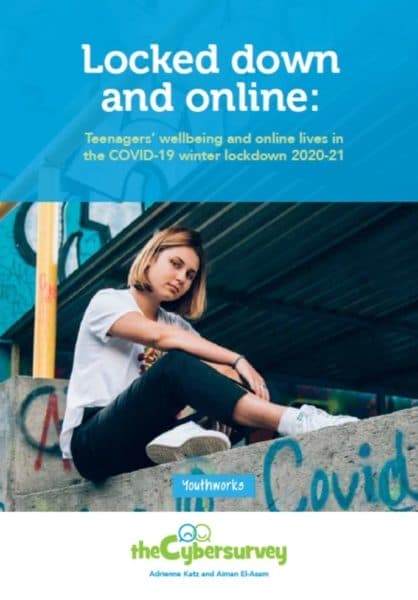“Life’s gone digital,” said a boy of 13 during the winter lockdown. A girl of the same age said, “I get a lot of bad thoughts that go through my head.” These two factors — emotional health and online life — came together in 2020 as never before.
Impact on wellbeing
By the autumn/winter lockdowns of 2020, almost 2/3 of young people surveyed by The Cybersurvey said, “I worry a lot.” More concerning still, 45% believed “My worries affect my life” and more than 2/3 felt nervous or anxious. More than half (53%) feel there are times when they cannot make their worries go away. COVID brought disruption to every familiar routine and devastation to so many families. Twice as many teens worried about life at home in 2020 compared to the year before.
By comparing data from 2019, the report, Locked Down and Online, explores what this has meant for young people. While they depended on their phones, tablets, games consoles and laptops as a lifeline to friends, fun and support, not to mention education, this is not all they found online. Many encountered harmful content about suicide, anorexia and misinformation about COVID. Teens also report online environments filled with sexist, homophobic and racist comments.
Worries increase year on year 2019/2021
- Almost 2/3 of young people say, ‘I worry a lot’ (6% up)
- 45% feel ‘My worries affect my life’ (5% up)
- 68% feel nervous or anxious (5% up)
- Twice as many worry about life at home
More harmful online content in 2020
- 31% saw online content talking about suicide (up 6% on 2019)
- 27% saw online content about anorexia (up 4% on 2019)
- 34% saw content about bulking up the body (up 6% on 2019)
- 42% saw misinformation about COVID
Vulnerable young people
Some vulnerable communities were more adversely affected than others. These include young people who said, “COVID-19 has affected me or my family badly” and were far more likely than others to be cyberbullied and feel isolated.
Young Carers were five times more likely than their peers to say “I have lost my friends due to missing so much school.” Ofcom reported that 1.8 million children had no device from which to access remote learning; as the 3rd lockdown began, it was estimated that 559,000 had no access at all while 913,000 only had access to learning via a parent’s mobile phone.
Comfort in tech
But in the privacy of their mobile phone life, if they had one, young people found solace. “When I’m frustrated or angry, I go on my phone and it makes me feel like I escaped the real world,” said a 12-year-old boy.
Another boy, aged 11, explained: “My phone is what I use for most of my time. It is probably the thing I enjoy most while in lockdown/quarantine. I usually spend most of my phone-time on TikTok and Youtube. A 15-year-old girl said, “My only real friends, I’ve met online, so I feel if I lose my phone, I lose them.”
Support for teens should include attention to their online lives or they may be pushed further into crisis by the harms they encounter. Or they may be influenced or manipulated online, often when desperately seeking connection, support and validation.






